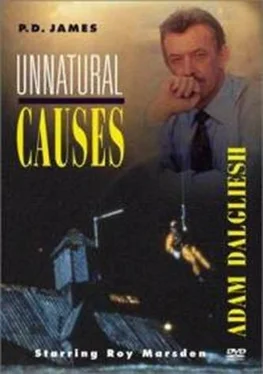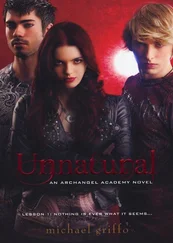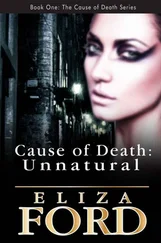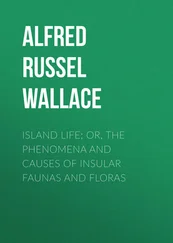P James - Unnatural Causes
Здесь есть возможность читать онлайн «P James - Unnatural Causes» весь текст электронной книги совершенно бесплатно (целиком полную версию без сокращений). В некоторых случаях можно слушать аудио, скачать через торрент в формате fb2 и присутствует краткое содержание. Жанр: Детектив, на английском языке. Описание произведения, (предисловие) а так же отзывы посетителей доступны на портале библиотеки ЛибКат.
- Название:Unnatural Causes
- Автор:
- Жанр:
- Год:неизвестен
- ISBN:нет данных
- Рейтинг книги:4 / 5. Голосов: 1
-
Избранное:Добавить в избранное
- Отзывы:
-
Ваша оценка:
- 80
- 1
- 2
- 3
- 4
- 5
Unnatural Causes: краткое содержание, описание и аннотация
Предлагаем к чтению аннотацию, описание, краткое содержание или предисловие (зависит от того, что написал сам автор книги «Unnatural Causes»). Если вы не нашли необходимую информацию о книге — напишите в комментариях, мы постараемся отыскать её.
Unnatural Causes — читать онлайн бесплатно полную книгу (весь текст) целиком
Ниже представлен текст книги, разбитый по страницам. Система сохранения места последней прочитанной страницы, позволяет с удобством читать онлайн бесплатно книгу «Unnatural Causes», без необходимости каждый раз заново искать на чём Вы остановились. Поставьте закладку, и сможете в любой момент перейти на страницу, на которой закончили чтение.
Интервал:
Закладка:
“I could have used that arsenic for Maurice just as easily and seen him die in agony any day I chose. It would have been easy. Too easy. Easy and unintelligent. Death by poison wouldn’t have satisfied any of the necessary conditions of Maurice’s murder. It was those conditions which made the crime so interesting to plan and so satisfying to execute. Firstly, he had to die from natural causes. Digby, as his heir, would be the natural suspect and it was important to me that nothing should jeopardise Digby’s inheritance. Then he had to die away from Monksmere; there must be no danger of anyone suspecting me. On the other hand I wanted the crime to be connected with the Monksmere community; the more they were harassed, suspected and frightened the better, I had plenty of old scores to be settled. Besides, I wanted to watch the investigation. It wouldn’t have suited me to have it treated as a London crime. Apart from the fun of watching the reactions of the suspects I thought it important that the police work should be under my eye. I must be there to watch and, if necessary, to control. It didn’t work out altogether as I had planned, but on the whole very little has happened which I haven’t known about. Ironically, I have been less skilful at times than I hoped at controlling my own emotions, but everyone else has behaved strictly according to my plan.
“And then there was Digby’s requirement to be met. He wanted the murder to be associated with L. J. Luker and the Cortez Club. His motive was different, of course. He didn’t particularly want Luker to be suspected. He just wanted to show him that there were more ways than one of committing murder and getting away with it. What Digby wanted was a death which the police would have to accept as natural-because it would be natural-but which Luker would know had been murder. That’s why he insisted on sending Luker the severed hands. I took most of the flesh off them first with acid-it was an advantage to have a dark room in the cottage and the acid available-but I still didn’t like the idea. It was a stupid, an unnecessary risk. But I gave in to Digby’s whim. A condemned man, by tradition, is pampered. One tries to gratify his more harmless requests.
“But before I describe how Maurice died there are two extraneous matters to get out of the way. Neither of them is important but I mention them because both had an indirect part in Maurice’s murder and both were useful in throwing suspicion on Latham and Bryce. I can’t take much credit for Dorothy Seton’s death. I was responsible, of course, but I didn’t intend to kill her. It would have seemed a waste of effort to plan to kill a woman so obviously bent on self-destruction. It couldn’t, after all, have been long. Whether she took an overdose of her drugs, fell over the cliff on one of her half-doped nocturnal wanderings, got killed with her lover on one of their wild drives around the country, or merely drank herself to death, it could only be a matter of time. I wasn’t even particularly interested. And then, soon after she and Alice Kerrison had left for that last holiday at Le Touquet I found the manuscript. It was a remarkable piece of prose. It’s a pity that people who say that Maurice Seton couldn’t write will never have the chance to read it. When he cared, he could write phrases that scorched the paper. And he cared. It was all there: the pain, the sexual frustration, the jealousy, the spite, the urge to punish. Who better than I could know how he felt? It must have given him the greatest satisfaction to write it all down. There could be no typewriter, no mechanical keys between this pain and its expression. He needed to see the words forming themselves under his hand. He didn’t mean to use it, of course. I did that; merely steaming open one of his weekly letters to her and including it with that. Looking back, I’m not even sure what I expected to happen. I suppose it was just that the sport was too good to miss. Even if she didn’t destroy the letter and confronted him with it he could never be absolutely sure that he himself hadn’t inadvertently posted it. I knew him so well, you see. He was always afraid of his own subconscious, persuaded that it would betray him in the end. Next day I enjoyed myself watching his panic, his desperate searching, his anxious glances at me to see whether I knew. When he asked whether I had thrown away any papers I answered calmly that I had only burnt a small quantity of scrap. I saw his face lighten. He chose to believe that I had thrown away the letter without reading it. Any other thought would have been intolerable to him so that was what he chose to believe until the day he died. The letter was never found. I have my own idea what happened to it. But the whole of Monksmere believes that Maurice Seton was largely responsible for his wife’s suicide. And who could have a better motive for revenge in the eyes of the police than her lover, Oliver Latham?
“It is probably unnecessary to explain that it was I who killed Bryce’s cat. That would have been obvious to Bryce at the time if he hadn’t been so desperate to cut down the body that he failed to notice the slip knot. If he had been in any condition to examine the rope and the method he would have realized that I could have strung up Arabella without lifting myself more than an inch or two in my chair. But, as I had anticipated, he neither acted rationally nor thought coolly. It never occurred to him for a second that Maurice Seton might not be the culprit. It may seem strange that I waste time discussing the killing of a cat but Arabella’s death had its place in my scheme. It ensured that the vague dislike between Maurice and Bryce hardened into active enmity so that Bryce, like Latham, had a motive for revenge. The death of a cat may be a poor motive for the death of a man and I thought it unlikely that the police would waste much time with Bryce. But the mutilation of the body was a different matter. Once the postmortem showed that Maurice had died from natural causes the police would concentrate on the reasons for hacking off the hands. It was, of course, vital that they should never suspect why this mutilation was necessary and it was convenient that there should be at least two people at Monksmere, both spiteful, both aggrieved, both with an obvious motive. But there were two other reasons why I killed Arabella. Firstly I wanted to. She was a useless creature. Like Dorothy Seton she was kept and petted by a man who believed that beauty has a right to exist, however stupid, however worthless, because it is beauty. It took only two twitching seconds on the end of a clothes line to dispose of that nonsense. And then, her death was to some extent a dress rehearsal. I wanted to try out my acting ability, to test myself under strain. I won’t waste time now describing what I discovered about myself. I shall never forget it; the sense of power, the outrage, the heady mixture of fear and excitement. I have felt that again many times since. I am feeling it now. Bryce gives a graphic account of my distress, my tiresomely uncontrolled behaviour after the body was cut down, and not all of it was acting.
“But to return to Maurice. It was by a lucky chance that I discovered the one fact about him that was crucial for my purpose-that he suffered badly from claustrophobia. Dorothy must have known of course. After all there were nights when she condescended to let him share her bedroom. He must have woken her sometimes with his recurring nightmare just as he woke me. I often wonder how much she knew and whether she told Oliver Latham before she died. That was a risk I had to take. But what if she did? No one can prove that I knew. Nothing can change the fact that Maurice Seton died from natural causes.
“I remember that night, over two years ago, very clearly. It was a wet, blustery day in mid-September and the evening grew wilder as darkness fell. We had been working together since ten o’clock that morning and it wasn’t going well. Maurice was trying to finish a series of short stories for an evening paper. It wasn’t his métier and he knew it; he was working against time and he hated that. I had broken off only twice, to cook us a light lunch at one-thirty and again at eight o’clock when I prepared sandwiches and soup. By nine o’clock when we had finished our meal, the wind was howling around the house and I could hear a high tide pounding on the beach. Even Maurice could hardly expect me to get home in my wheelchair once darkness had fallen and he never offered to drive me home. That, after all, would put him to the trouble of fetching me again next day. So he suggested that I should stay the night. He didn’t ask me if I were willing. It didn’t occur to him that I might object or that I might perhaps prefer my own toothbrush or toilet things or even my own bed. The ordinary courtesies of life didn’t apply to me. But he told me to put sheets on the bed in his wife’s old room and he came himself to look for a nightdress for me. I don’t know why. I think it may have been the first time since her death that he had brought himself to open her drawers and cupboards and that my presence was both an opportunity for breaking a taboo and a kind of support. Now that I can wear any of her underclothes or can rip them to shreds just as the fancy takes me, I can bring myself to smile at the memory of that night. Poor Maurice! He hadn’t remembered that those wisps of chiffon, those bright transparencies in nylon and silk would be so pretty, so delicate, so very unsuitable for my twisted body. I saw the look on his face as his hands hovered over them. He couldn’t bear to think of her clothes against my flesh. And then he found what he wanted. It was there at the bottom of the drawer, an old woollen nightdress which had belonged to Alice Kerrison. Dorothy had worn it once at Alice’s insistence when she had been ill with influenza and was sweating with rigor. And it was this nightdress which Maurice handed to me. Would his fate have been any different, I wonder, if he had acted otherwise that night? Probably not. But it pleases me to think that his hands, hesitating over the layers of gaudy nonsense, were choosing between life and death.
Читать дальшеИнтервал:
Закладка:
Похожие книги на «Unnatural Causes»
Представляем Вашему вниманию похожие книги на «Unnatural Causes» списком для выбора. Мы отобрали схожую по названию и смыслу литературу в надежде предоставить читателям больше вариантов отыскать новые, интересные, ещё непрочитанные произведения.
Обсуждение, отзывы о книге «Unnatural Causes» и просто собственные мнения читателей. Оставьте ваши комментарии, напишите, что Вы думаете о произведении, его смысле или главных героях. Укажите что конкретно понравилось, а что нет, и почему Вы так считаете.












